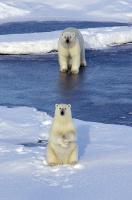A Vancouver Province newspaper editorial criticizing the U.S. government for proposing polar bears as a possible threatened species has the scientists it quoted crying foul. Calling the US decision “a classic case of blinkered thinking,” the Province claims that Mitchell Taylor, manager of wildlife research for the Nunavut government, has been quoted as saying that, except for Hudson Bay, “polar bears appear to be overabundant.”
The newspaper said in its Dec. 29, 2006 edition that it didn’t dispute that higher temperatures appear to be causing early breakup of sea ice in parts of the Arctic, particularly western Hudson Bay. And the less ice, the more bears are forced onto land for survival. But even if warmer weather is changing the bears’ habitat, there is no scientific consensus that man-made pollution is the sole culprit.
To further bolster its argument, the Province cited a theory put to a conference in Seattle last year saying old sea ice is flushed out in a natural process known as Arctic oscillation. Its proponent, Ignatius Rigor of the University of Washington, warned: “One needs to be very careful extrapolating the future of sea ice from a short-term trend out to a 100-year time frame.”
Contacted by DeSmog readers, however, both Taylor and Rigor said they were misquoted in the Province editorial.
“I don’t even know what “overabundant” means,” said Taylor. “There are some populations that appear to be at levels where problem-bear issues are at or approaching unacceptable levels. I have said that in various interviews. I think it is pretty clear what the (Province) author’s perspective is on climate change and polar bears. I guess this is freedom of the press in action.”
For his part, Rigor said “I unfortunately get misquoted as a global warming skeptic quite a bit since I do not think that temperature is the primary driver of the decline of Arctic sea ice, and as quoted in this article, I think that changes in wind patterns associated with the Arctic Oscillation (AO) flushed most of the older, thicker sea ice out of the Arctic.
“But what often gets left out of my quotes, maybe due to a lack of clarity on my part, is that there is a trend in the AO and most climate models do NOT reproduce this trend with out increasing green-house gases in their models. So, to be more precise, I do not think temperature is everything, BUT I do believe that human produced increases in greenhouse gases in the atmosphere is the primary driver of the climate changes we are seeing now. And if we look at the whole picture, not just limited areas of the globe and short spans of time, I would say that humans are changing climate in dramatic, and sometimes catastrophic ways.” (emphasis added)
Subscribe to our newsletter
Stay up to date with DeSmog news and alerts






